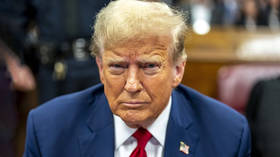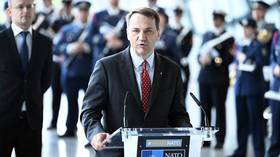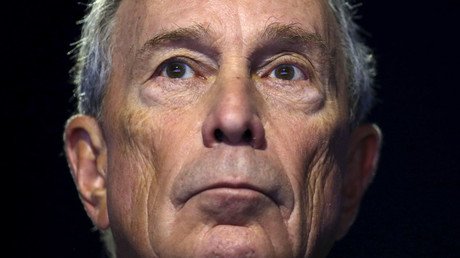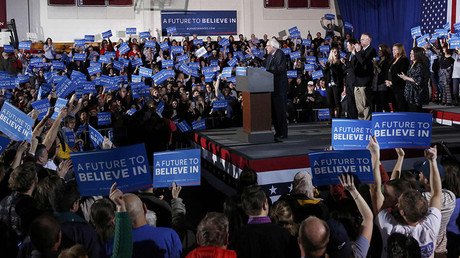DNC ends ban on lobbyist, PAC donations - report
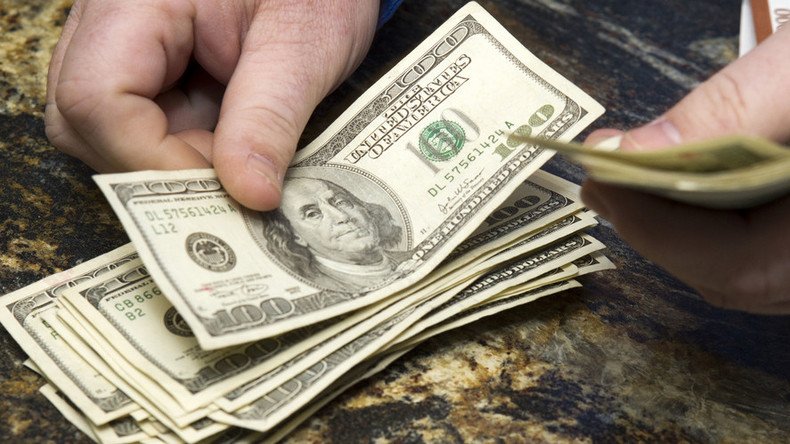
In what could be a boon for presidential candidate Hillary Clinton, the Democratic National Committee has quietly ended its ban against accepting financial contributions from federal lobbyists and political action committees, according to a new report.
The rules banning such donations, introduced by then-presidential candidate Barack Obama in 2008, were dropped in recent months, the Washington Post reported. Major power players in the Democratic Party have long complained about the restrictions, all of which have been dropped – except for a rule disallowing lobbyists and political action committee (PAC) representatives from attending events featuring President Obama, Vice President Joe Biden, or their spouses.
A DNC spokesman indicated that the rule changes are part of the party's effort to stay in the White House once Obama leaves office in January 2017.
“The DNC’s recent change in guidelines will ensure that we continue to have the resources and infrastructure in place to best support whoever emerges as our eventual nominee,” said Mark Paustenbach, deputy communications director for the DNC.
“Electing a Democrat to the White House is vital to building on the progress we’ve made over the last seven years, which has resulted in a record 71 straight months of private-sector job growth and nearly 14 million new jobs.”
Doesn't a decision like this by the DNC, while practical financially, only play into Bernie's messaging? https://t.co/ieT2LU7s7Q
— Chuck Todd (@chucktodd) February 12, 2016
Three Democratic lobbyists confirmed to the Post that they have recently received solicitations for financial contributions from the DNC, which, like its counterpart the Republican National Committee, coordinates campaign strategy and fundraising for the party's candidates, especially on the national level.
The lobbyists said "the DNC is back to pre-2008 business as usual," the Post reported, as the committee has even hired a finance director to coordinate PAC donations.
Yesterday, @HillaryClinton promised to reform campaign finance. Today, @DWStweets / DNC has lifted the ban on federal lobbyist contributions
— erin shade (@erinshade) February 12, 2016
Campaign-finance reform advocates and those opposed to Big Money's influence on American politics voiced discontent with the DNC's decision.
"This move by the DNC is a major step in the wrong direction and is in direct conflict with the American people’s deep concerns about the role of influence-money in Washington," said Fred Wertheimer, president of the nonpartisan campaign-finance reform group Democracy 21.
"The DNC is acting as if the party is blind to the anger and frustration with Washington that is being expressed by voters in both parties as the presidential nominating process unfolds," he added.
Hillary Sanders? Clinton singing Bernie’s tune on banks, campaign finance https://t.co/MSfrJ9hbMXpic.twitter.com/D1d0IdV455
— RT America (@RT_America) February 11, 2016
The move is likely to become an issue in the contest for the party's presidential nomination between US Senator Bernie Sanders and former Secretary of State Hillary Clinton. Clinton's Hillary Victory Fund is a joint fundraising committee "authorized by" her campaign, the DNC, and 33 state Democratic Parties.
Hillary Victory Fund raised $26.9 million in 2015, Bloomberg News reported earlier this month. A joint fundraising committee between the DNC and Sanders raised just $1,000 last year.
Clinton bias accusations chase top Democrat Wasserman Schultz https://t.co/I5xZZeHFMLpic.twitter.com/bWmvnO8QUq
— RT America (@RT_America) January 31, 2016
It is the Clinton campaign – as well as top power players in the party and beyond – that stands to gain from the DNC rule change, according to Wertheimer.
"The DNC decision to accept contributions from lobbyists creates dangerous new opportunities for influence-buying by Washington lobbyists who will now be able to make six-figure contributions to the Hillary Victory Fund," he said. "The DNC has also opened the door to the political extortion of huge contributions from Washington lobbyists by those soliciting the contributions for the Victory Fund."
Clinton has received criticism from Sanders for the amount of cash her campaign has garnered from top super PACs, such as Priorities USA Action, which has just launched a major effort in South Carolina, site of the next presidential primary, in support of Clinton, who was handily defeated by Sanders in the New Hampshire primary earlier this week.
Total Bern? Sanders lays smackdown on Kissinger and Clinton, moderator gasps (VIDEO) https://t.co/T1J5aUsRKOpic.twitter.com/0IvZv2dW3l
— RT America (@RT_America) February 12, 2016
On Thursday, during the sixth Democratic presidential primary debate, Sanders said Clinton was the Wall Street candidate in their race and represents the Big Money status quo.
"Secretary Clinton’s super PAC, as I understand it, received $25 million last reporting period, $15 million from Wall Street," Sanders said. "Our average contribution is $27. I’m very proud of that."
Clinton responded by asserting that she has taken stands against Wall Street corruption. She said Barack Obama received more Wall Street money than she did during the Democratic presidential nomination contest of 2008.
"So, let’s not in any way imply here that either President Obama or myself would in any way not take on any vested interest, whether it’s Wall Street or drug companies or insurance companies or, frankly, the gun lobby, to stand up to do what’s best for the American people," she said.
To which Sanders replied: "Let’s not insult the intelligence of the American people. People aren’t dumb. Why in God’s name does Wall Street make huge campaign contributions? I guess, just for the fun of it. They want to throw money around."
Despite his lack of Super PAC firepower relative to Clinton's, Sanders out-raised Clinton in January to the tune of $20 million to $15 million. It marked the first time the Sanders campaign has ever outpaced Clinton's monthly fundraising haul.





